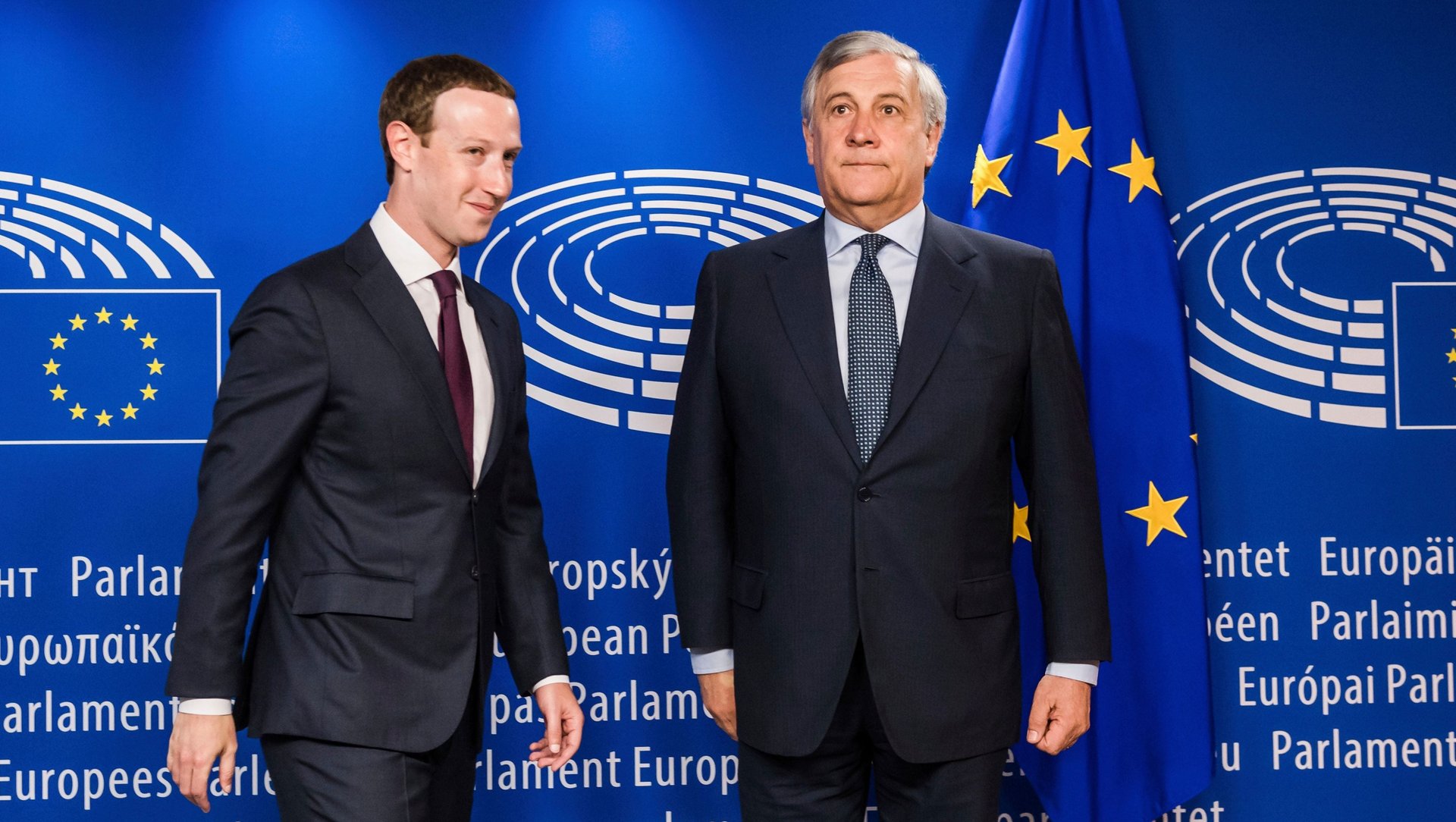Mark Zuckerberg’s EU parliament meeting was spectacularly awkward
Facebook CEO Mark Zuckerberg met with members of the European Parliament today (May 22) in what was billed as a “meeting” but ended up being more of an awkward hearing, in which the executive took a public lashing but was also let off the hook from many tough, detailed questions.


Facebook CEO Mark Zuckerberg met with members of the European Parliament today (May 22) in what was billed as a “meeting” but ended up being more of an awkward hearing, in which the executive took a public lashing but was also let off the hook from many tough, detailed questions.
In one particularly uncomfortable moment for Zuckerberg, Nigel Farage, the well-known euro-skeptic and far-right leader, said that without social media, Trump and Brexit wouldn’t have happened, since these causes were able to circumvent traditional media to get their message to the public. “Perhaps you’re horrified by this creation of yours and what it’s led to,” he said to the 34-year-old, who looked a bit flabbergasted.
For the better part of the meeting, which was scheduled to last a little over an hour, the politicians lobbed their questions and reflections on technology at Zuckerberg, who, at the end, repeated talking points he’s given to US lawmakers, journalists, and investors over the past several months.
The European parliament initially invited Zuckerberg to testify a month ago, but the CEO only agreed to come to Brussels last week.
Regulation was at the forefront of the hearing, as a sweeping set of privacy laws are set to take effect in the EU this Friday, May 25. Many of the members of the parliament skeptically asked Zuckerberg whether his company would be fully compliant with the laws, known as General Data Protection Regulation. He assured them it would, as soon as the regulations take effect.
Leader of the European People’s Party, Manfred Weber, asked whether Facebook was a monopoly, and suggested the company should be broken up. “Can you convince me not to do so?” he asked. (US senator Lindsey Graham brought up the same idea in the Congressional hearings.)
The lawmakers took great pains to point out to Zuckerberg that policies that work in the US won’t necessarily work in the EU. For example, they pointed to the differences in the treatment of free speech. In Europe, Nazi propaganda is not acceptable, said Weber, while in the US it falls under freedom of expression. Lawmakers should not be asking the company to establish rules of conduct on its own “but clearly to regulate what is allowed and what is not.”
Farage and Nicolas Bay from France’s National Front followed the lead of their American counterparts on the right in pressing Zuckerberg about political bias on the platform, claiming Facebook was suppressing conservative voices.
“This arbitrary censorship, is it compatible with the fundamental of our democracy?” asked Bay. “The hunt for fake news is very fashionable right now, but hasn’t that become a new excuse for further restricting freedom of opinion and expression?”
“Who decides?” asked Farage, who said that his engagement has been down by about 25% following Facebook’s algorithm change. “Why is there no transparency in this process?” Zuckerberg later answered that the algorithm change affected all public pages, not just those on the right.
The members of parliament raised several under-the-radar ideas. Weber suggested that Facebook’s algorithms are “incomprehensible,” and that perhaps regulation should consider making algorithms public.
Guy Verhofstadt, leader of the Alliance of Liberals and Democrats for Europe, who was perhaps the most feisty of the lawmakers, asked whether Facebook would compensate its users, a provision included in the GDPR (a common argument among Facebook observers is that users are actually free laborers for the company, and advertisers are the real customers). Verhofstadt compared also Zuckerberg to Kalden, the founder of the fictional tech corporation in Dave Eggers’ book “The Circle,” who has “no control over the company.” Then he went even further:
You have to ask yourself how you will be remembered. As one of the three big internet giants together with Steve Jobs and Bill Gates who have enriched our world and societies, or on the other hand, the genius that created a digital monster that is destroying our democracies and our societies?
The lawmakers also appeared not to be satisfied with Facebook’s past answers on the Cambridge Analytica scandal, and worried about Facebook’s ability to protect the upcoming European Parliament elections. The company recently suspended 200 apps for potentially misusing data, which prompted Claude Moraes, chair of the parliament’s civil liberties committee, to ask, “Isn’t this a clear signal that Facebook has failed to protect the privacy of its users?”
At the very end of the hearing, when it had gone over its scheduled time, there were several strained minutes, during which Zuckerberg clearly wanted to stop talking in order to avoid answering some of the more uncomfortable questions. Since no one stopped him, he said he wanted to “be sensitive to time” and ignored questions that some of the more insistent politicians kept repeating, like whether Facebook would allow users to avoid targeted advertising. He said he’d give the other answers in writing, which only sparked more quibbling among the members.